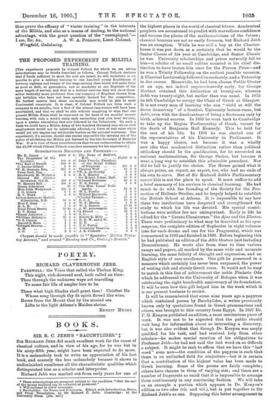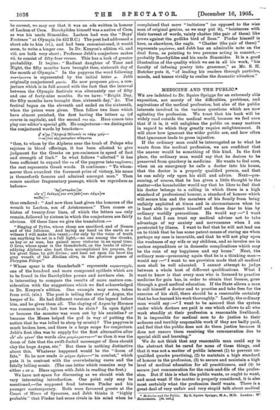SIR R. C. JEBB'S " BACCHYLEDES."
BOOKS.
Six RICHA.RD JEBB did much excellent work for the cause of classical culture, and in view of his age, for he was but in his sixty-fifth year, might have been expected to do more. Ibis a melancholy task to write an appreciation of his last book, and scarcely the less melancholy because it shows in undiminished excellence all the characteristic qualities which distinguished him as a scholar and interpreter.
Richard Jebb was marked out from early years for one of
• These subscriptions are promised subject to the condition "that the rest of the money required can be collected or promised." t Will increase to £50 if necessary. Bacchylides: the Poems and Fragments. Edited, with Introduction, Notes, and Prose Translation, by Sir Richard C. Jobb. Cambridge : at the University Press. [15s. net.] the highest places in the world of classical letters. Academical prophets are accustomed to predict with marvellous confidence and success the places of the mathematicians of the future; classical honours are not so easily foreseen, but Richard Jebb was an exception. While he was still a boy at the Charter- house it was put down as a certainty that he would be the Senior Classic of his year at Cambridge, and Senior Classic he was. University scholarships and prizes naturally fell to him—a scholar of no small calibre counted it his chief dis- tinction to have beaten him once for the Porson Prize—and he won a Trinity Fellowship on the earliest possible occasion. A Classical Lectureship followed immediately, and a Tutorship in due course. Meanwhile, he had been chosen Public Orator at an age, not indeed unprecedentedly early, for George Herbert obtained this distinction at twenty-six, whereas Jebb was twenty-eight, but earlier than was usual. In 1875 he left Cambridge to occupy the Chair of Greek at Glasgow. It is not every man of learning who can "wield at will the fierce democracy" of a Scottish University lecture-room, but Jebb, even with the disadvantage of being a Scotsman only by birth, achieved success. In 1889 be went back to Cambridge to take up the Regius Professorship of Greek, vacant by the death of Benjamin Hall Kennedy. This he held for the rest of his life. In 1891 he was elected one of the representatives of his University in Parliament. It was a happy choice, not because it was a wholly new idea that academical distinction rather than political orthodoxy should be the qualification, for he succeeded an eminent mathematician, Sir George Stokes, but because it went a long way to establish this admirable precedent. Nor did be fail to justify the choice. The House gained what it always prizes, an expert, an expert, too, who had no ends of his own to serve. But of Sir Richard Jebb's Parliamentary career this is not the place to speak. It must suffice to add a brief summary of his services to classical learning. He had much to do with the founding of the Society for the Pro- motion of Hellenic Studies, and he largely helped to establish the British School at Athens. It is impossible to say how these two institutions have deepened and strengthened the study to which his life was devoted. His special contri- butions were neither few nor unimportant. Early in life he edited for the " Catena Classicorum" the Ajax and the Electra. These were preliminary to what may be described as his opus magnum, the complete edition of Sophocles in eight volumes (one for each drama and one for the Fragments), which was commenced in 1883 and finished in 1896. Before beginning this he had published an edition of the Attic Orators (not including Demosthenes). He wrote also from time to time various essays and papers, all marked by the same wide and accurate learning, the same felicity of thought and expression, and an English style of rare excellence. One gift he possessed in a measure which certainly has never been surpassed, the power of writing rich and stately Greek verse. It would not be easy to match in this line of achievement the noble Pindaric Ode which he addressed to the University of Bologna when it was celebrating the eight hundredth anniversary of its foundation. It will be seen how this gift helped him in the work which it is our present business to review.
It will be remembered that some nine years ago a papyrus which contained poems by Bacchylides, a writer previously known only by quotations found in Greek grammarians and others, was brought to this country from Egypt. In 1897 Dr. F. G. Kenyon published an edition, a most meritorious piece of work. It was not to be expected that the public should wait long for information about so interesting a discovery, but it was also evident that though Dr. Kenyon was amply qualified for his task, and had received help from other scholars—he makes special mention of his obligations to Professor Jebb—he bad not said the last word on so difficult a subject. It might be rash to affirm that we have this "last word" even now—the condition of the papyrus is such that there is an unlimited field for conjecture—but it is certain that a contribution of the highest value has been made to Greek learning. Some of the poems are fairly complete; others have chasms in them of varying size; and there are a number of fragments so small that it id impossible to arrange them continuously in any convincing fashion. We will take as an example a portion which appears in Dr. Kenyon's edition as two odes (vii. and viii.), but is put together in Sir Richard Jebb's as one. Supposing this latter arrangement to
2 0 0 2 2 0
be correct, we may say that it was an ode written in honour of Lachon of Ceos. Bacchylides himself was a native of Ceos, as was his uncle Simonides. Lachon had won the "Boys' Footrace" at Olympia (in 452 B.C.) The poet had addressed a short ode to him (vi.), and had been commissioned, it would seem, to write a longer one. In Dr. Kenyon's edition vii. and viii. are both very short ; Professor Jebb's conjecture makes vii. to consist of fifty-four verses. This has a look of greater probability. It begins : "Radiant daughter of Time and Night, the fifty months have brought thee, sixteenth day of the month at Olympia." In the papyrus the word following revripcovra is represented by the initial letter a. Jebb originally conjectured ailvds. He now proposes p.i)ves, a con- jecture which is in full accord with the fact that the interval between the Olympic festivals was alternately one of fifty and one of forty-nine months. So we have : "Bright Day, the fifty months have brought thee, sixteenth day," Sze. The festival began on the eleventh and ended on the sixteenth, when the prizes were given. Then follow two lines which have almost perished, the first having the letters op (of course in capitals), and the second ros aid. Here comes into play our editor's special gift. He conjectures—we distinguish the conjectured words by brackets- cir idap ['AA(pftri WiLortfs vs 14(1)47 Xatp- -or]ros alp[cucouptats rim-purr= "thee, to whom by the Alpheus near the tomb of Pelops who rejoices in blood offerings, it has been allotted to give judgment for the Greeks on pre-eminence in speed of foot and strength of limb." In what follows " allotted " it has been sufficient to expand the ra of the papyrus into raxt;rara; the rest represents Greek words. It continues : "To whom- soever thou awardest the foremost prize of victory, his name is thenceforth famous and admired amongst men." Then comes another fragmentary passage, which we reproduce as before-
'ApEICP70/16,61jOY
WOW ilCoCryll[012S iLTTE]OY[01(fl Adxo.,]va thus rendered: rendered : " And now thou bast given the honours of the wreath to Lachon, son of Aristomenes." Then comes an hiatus of twenty-four lines, of which the letters oyw only remain, followed by sixteen in which the conjectures are fairly obvious. Of these lines we give the translation :— " Singing of Pythe, whose sheep are sacrificed, and of Nemea and of the Isthmus. And laying my hand on the earth as a witness I will make this vaunt ;—for only by the voice of truth can anything be set in a full light,—no one among the Greeks, as boy or as man, has gained more victories in an equal time. 0 Zeus, whose spear is the thunderbolt, on the banks of silver- eddying Alpheus also haat thou accomplished his prayers, for his great fame, by gift divine; and hast set upon his brow the gray wreath of the 2Etolian olive, in the glorious games of Phrygian Pelops."
"Whose spear is the thunderbolt" represents KepavvEyxis, one of the hundred and more compound epithets which are to be found in the Bacchylides poems and nowhere else. It is interesting to compare the results of more mature con-
sideration with the suggestions which we find acknowledged in Dr. Kenyon's edition. One example may serve, taken
from xviii. (xix.) The poet is telling the story of Argus, the keeper of lo. He had different versions of the legend before him, and he gives them all. The slaying of Argus by Hermes was common to all ; but how was he slain ? In open fight ? or because the monster was worn out by his anxieties? or because the Muses helped the god (a way of putting the notion that he was lulled to sleep by music) ? The papyrus is much broken here, and there is a large scope for conjecture. Jebb's first idea was to supply for the first alternative after oin) yiver the words aia-a potp6Kpavros—" so then it was the doom of fate that the swift-footed messenger of Zeus should slay the huge Argus, etc." But there is nothing distinctive about this. Whatever happened would be the "doom of fate." So he now reads 1.14Xac dyijI,C." in combat," which puts it in contrast with the overwhelming cares and the fatally lulling music. (The one letter which remains may be either e or a. Blass agrees with Jebb in reading the first.)
We have not space for discussing as we should wish the very interesting introduction. One point only may be mentioned,—the supposed feud between Pinder and his younger contemporary. Both were favoured guests at the Court of Hiero of Syracuse, and Jebb thinks it "highly probable" that Pindar had some rivals in his mind when he
complained that mere "imitators" (as opposed to the wise man of original genius, as we may put it), "boisterous with their torrent of words, vainly chatter (the pair of them) like crows against the godlike bird of Zeus." Pindar himself is here, as elsewhere, the eagle. "Chatter (the pair of them)" represents yaplerov, and Jebb has an admirable note on the dual form, as pointing to two persons acting in concert,— probably Bacchylides and his uncle Simonides. It is a good illustration of the quality which we see in all his work, "his faculty of infusing poetry into grammar," as Mr. S. H. Butcher puts it, "of leading his readers through particles, moods, and tenses vividly to realise the dramatic situation."



















































 Previous page
Previous page